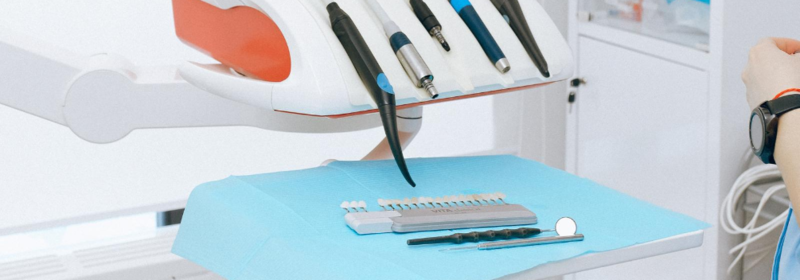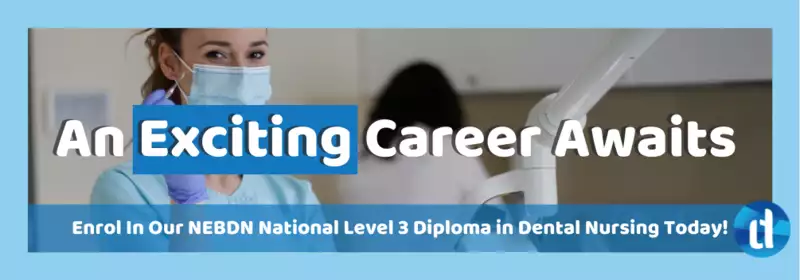Becoming a dental nurse is a very rewarding and varied role. Not only is there a lot of opportunity for growth and development in the job. It also isn’t a long process to get qualified as a dental nurse in the first place.
With many roles in healthcare requiring years of training and study, some dental nurses can find themselves fully qualified and working in as little as a year.
So, if you’re after a new career with little downtime whilst you learn then dental nursing could be for you.
A career as a dental nurse requires you to be willing to help others and assist your team. As a dental nurse, you’ll play an important part in dental procedures and treatments as well as following hygiene protocol.
You’ll need to be calm and work well under pressure. Dental clinics are often a cause of anxiety for people so having a reassuring presence there can help massively.
If you think you can provide excellent care and be a valued member of a dental nursing team then read on to learn how to get qualified.
Routes into Dental Nursing

There are several available routes when considering becoming a dental nurse. So, it shouldn’t be hard to find the option that works for you.
However, it’s important that whatever route you take to get qualified is approved by the General Dental Council (GDC).
The GDC are an independent group that regulates dental care professionals across the UK. Without GDC approval your dental nurse qualification will not be recognised.
However, you can still work as a trainee dental nurse, or a dental nursing assistant without a GDC-approved qualification and receive training. Although you won’t be allowed to practice certain procedures as you won’t be qualified.
Diplomas
Online learning providers and local colleges alike can provide GDC-approved dental nursing diplomas.
Requirements for each provider can vary but most look for GCSE maths, English and preferably a science as well.
Whether it’s online or through a physical college you’ll receive the exact same training as long as your dental nurse course is GDC-approved. The difference is online learning is the more flexible option when it comes to your dental nurse learning.
Not everyone can attend class during the day or evenings due to work and other commitments. Therefore, online study is a great alternative to progress with your dental nurse learning journey whilst not affecting your existing schedule.
It is also beneficial to enrol on a dental nursing course by the National Examining Board of Dental Nurses (NEBDN). The NEBDN is a GDC-recognised qualification and covers all of the guidelines within the GDC Preparing to Practice document.
It’s not a requirement to study through this awarding body but it’s highly favoured for dental nurses. It also means you’ll be secure in knowing that you’ve chosen the right dental nursing course for your career path.
Foundation Degree
However, a foundation degree is a stand-alone qualification that can be completed between 1 and 3 years of study. Depending on the institution and whether you’ll be a part or full-time student.
Foundation degrees also offer the same funding opportunities as other higher education students. This means you are eligible for student finance, maintenance loans and grants if you haven’t already studied at this level.
Universities can set their own requirements so the criteria for entry onto dental nursing degrees may vary.
However, they commonly look for applicants with A Levels or equivalent Level 3 qualifications. This is to show you have relevant knowledge and a certain level of understanding.
Assuming you have all the relevant qualifications then you can either apply on UCAS or directly through the institutions.
Apprenticeships
A level 3 apprenticeship provides a more hands-on approach to your learning. You’ll receive on the job training whilst gaining valuable work experience for dental nursing jobs.
To be considered for a dental nurse apprenticeship, you need to show a willingness to work as a team and a commitment to your learning. Dental nurse apprenticeships usually last 2 years and require you to study independently of your training at work.
If you’re more of a practical learner, then a dental nurse apprenticeship would be a good option, and most employers will cover the cost of your dental nursing qualification as well as pay you a starter salary.
Roles & Responsibilities

Once you’re a qualified dental nurse you’ll be able to work at a dental practice or in a hospital setting. In either public (NHS) or private care.
Each day will vary as the patients that come in will require different treatments and procedures. So, the workday should fly by as you’ll never have exactly the same day twice.
That being said you will find that you carry out the following tasks as a dental nurse:
- Preparing and passing instruments to the dentist or hygienist
- Suctioning water and saliva from the patient’s mouth during treatment
- Preparing fillings and other materials
- Providing support and reassurance to the patient
- Sterilising instruments
- Processing and filing x-rays
- Tidying and cleaning the dental surgery
- Recording and filing information about patients
- Advising patients on oral hygiene
- Carrying out stock control
Dental nurses in hospitals will often find their days filled with assisting surgeries and extractions. Whilst if you’re working in a dental practice, you’ll find your day to be slightly more routine.
Career Development
Qualified dental nurses can also consider training in the following areas of dental care:
Dental Receptionist
There are specific courses out there for those dental nurses wishing to become a dental receptionist. These courses will teach you the correct etiquette when dealing with customer queries and complaints, the right telephone manner and the required organisational skills.
Practice Managers
Practice managers oversee dental practices. This is a demanding role that requires you to have sound organisational and planning skills. You’ll need to have worked at a dental practice for a few years before becoming a practice manager.
The job requires you to manage the staff and day-to-day functions of the practice. You would also need to make sure government guidelines are being met and legislation followed correctly.
Dental Hygienist
A dental hygienist performs specialised procedures to deep clean the teeth and gums. By doing so they ensure that the patient's oral health is not compromised.
A 2-year diploma in dental hygiene or dental therapy will allow you to become a dental hygienist. Alternatively, you could take an undergraduate degree in oral health or dental therapy and dental hygiene.
Whatever route you end up taking you’ll find yourself in an exciting new career in dental nursing. All options provided are valid choices, so it just depends on what’s right for you.
learndirect is one of the UK’s leading distance learning providers. Offering courses from GCSEs to Access to Higher Education Diplomas.
All our courses are guided by an expert tutor to assist you with your studies. As well as flexible payment options to help you spread the cost. Check out our blog for more helpful tips on how to prepare for your online education here.
Click below to enrol on our new, NEBDN certified and GDC approved, National Diploma in Dental Nursing.
Places are limited for this course so don’t delay.



















